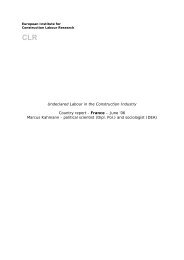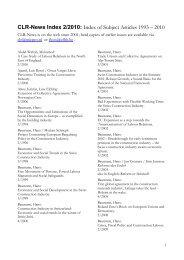Japan – what can we learn? - Construction Labour Research
Japan – what can we learn? - Construction Labour Research
Japan – what can we learn? - Construction Labour Research
Create successful ePaper yourself
Turn your PDF publications into a flip-book with our unique Google optimized e-Paper software.
unions on their part have advocated industrial, employment, and wagepolicies taking their respective industrial situations into account. Thetrade unions are searching for ways that <strong>can</strong> make invigoration of theirindustries compatible with the protection and improvement ofemployment and working conditions.It is also noted that at the enterprise level the unions make it theirstrategic task to more intensely work on management to persuade thelatter to adopt the unions' alternative plans about business policy,investment, and organisational improvement. In the midst of this tugof-warbet<strong>we</strong>en union and management, some strategic choices havebeen taken as to where the <strong>Japan</strong>ese employment system is going.Trade unions are expected to fully display their organisational,intellectual, and moral capacities in order to bring about compatibilitybet<strong>we</strong>en industrial revitalisation and quantitative preservation cumqualitative improvement of employment.3. Towards a Participatory Industrial Society.3.1 The basic conditions for reforming the unions.<strong>Japan</strong>’s industrial democracy now stands at a crossroad. Union densityhas continued to decline since the mid 1970s. In 2003, it fell below 20percent. The latest figure for union density is 18.7 percent in 2005,which stands at 10,138,000 in terms of actual membership (Ministryof Health, <strong>Labour</strong> and Welfare, Rodo Kumiai Kiso Chosa - BasicSurvey on <strong>Labour</strong> Unions, 2005). Non-union personal management isbecoming more and more common in contemporary business.Democracy in “corporate society” is currently facing a crisis. Toremove this crisis in industrial democracy, <strong>Japan</strong>ese trade unions needto reform themselves to cope with the rapidly changing environment.There are some major issues that must be considered when discussingthe reform of enterprise unions (Suzuki 2000). First, before being ableto increase their influence in managerial decision-making policies,unions must reinforce their strength, policy and action to forcemanagement to recognize their presence as a partner in an effort tocreate a management structure based on discussion and consensus.Second, in the light of the increase of non-regular employees, such aspart-time and dispatched workers, it is necessary for unions to workeven harder to ensure they receive fair treatment in corporate societywhile actively working to unionise them. Third, it is necessary toCLR News No 2/200658









